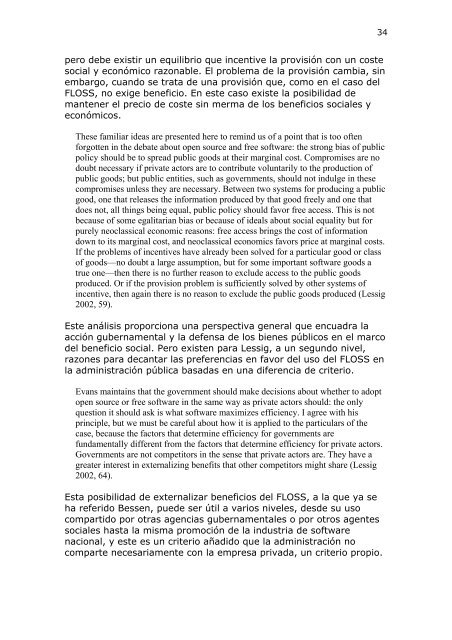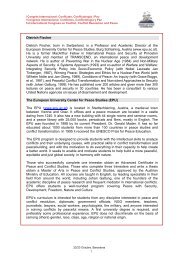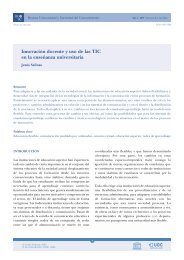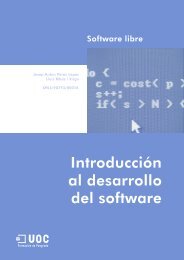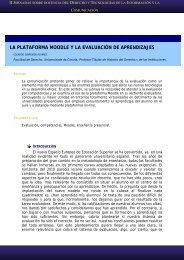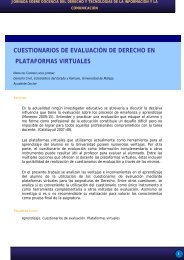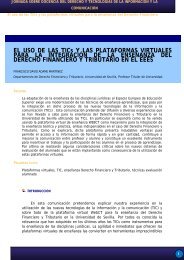El uso del software libre en las administraciones públicas de la UE
El uso del software libre en las administraciones públicas de la UE
El uso del software libre en las administraciones públicas de la UE
You also want an ePaper? Increase the reach of your titles
YUMPU automatically turns print PDFs into web optimized ePapers that Google loves.
34pero <strong>de</strong>be existir un equilibrio que inc<strong>en</strong>tive <strong>la</strong> provisión con un costesocial y económico razonable. <strong>El</strong> problema <strong>de</strong> <strong>la</strong> provisión cambia, sinembargo, cuando se trata <strong>de</strong> una provisión que, como <strong>en</strong> el caso <strong><strong>de</strong>l</strong>FLOSS, no exige b<strong>en</strong>eficio. En este caso existe <strong>la</strong> posibilidad <strong>de</strong>mant<strong>en</strong>er el precio <strong>de</strong> coste sin merma <strong>de</strong> los b<strong>en</strong>eficios sociales yeconómicos.These familiar i<strong>de</strong>as are pres<strong>en</strong>ted here to remind us of a point that is too oft<strong>en</strong>forgott<strong>en</strong> in the <strong>de</strong>bate about op<strong>en</strong> source and free <strong>software</strong>: the strong bias of publicpolicy should be to spread public goods at their marginal cost. Compromises are nodoubt necessary if private actors are to contribute voluntarily to the production ofpublic goods; but public <strong>en</strong>tities, such as governm<strong>en</strong>ts, should not indulge in thesecompromises unless they are necessary. Betwe<strong>en</strong> two systems for producing a publicgood, one that releases the information produced by that good freely and one thatdoes not, all things being equal, public policy should favor free access. This is notbecause of some egalitarian bias or because of i<strong>de</strong>als about social equality but forpurely neoc<strong><strong>la</strong>s</strong>sical economic reasons: free access brings the cost of informationdown to its marginal cost, and neoc<strong><strong>la</strong>s</strong>sical economics favors price at marginal costs.If the problems of inc<strong>en</strong>tives have already be<strong>en</strong> solved for a particu<strong>la</strong>r good or c<strong><strong>la</strong>s</strong>sof goods—no doubt a <strong>la</strong>rge assumption, but for some important <strong>software</strong> goods atrue one—th<strong>en</strong> there is no further reason to exclu<strong>de</strong> access to the public goodsproduced. Or if the provision problem is suffici<strong>en</strong>tly solved by other systems ofinc<strong>en</strong>tive, th<strong>en</strong> again there is no reason to exclu<strong>de</strong> the public goods produced (Lessig2002, 59).Este análisis proporciona una perspectiva g<strong>en</strong>eral que <strong>en</strong>cuadra <strong>la</strong>acción gubernam<strong>en</strong>tal y <strong>la</strong> <strong>de</strong>f<strong>en</strong>sa <strong>de</strong> los bi<strong>en</strong>es públicos <strong>en</strong> el marco<strong><strong>de</strong>l</strong> b<strong>en</strong>eficio social. Pero exist<strong>en</strong> para Lessig, a un segundo nivel,razones para <strong>de</strong>cantar <strong><strong>la</strong>s</strong> prefer<strong>en</strong>cias <strong>en</strong> favor <strong><strong>de</strong>l</strong> <strong>uso</strong> <strong><strong>de</strong>l</strong> FLOSS <strong>en</strong><strong>la</strong> administración pública basadas <strong>en</strong> una difer<strong>en</strong>cia <strong>de</strong> criterio.Evans maintains that the governm<strong>en</strong>t should make <strong>de</strong>cisions about whether to adoptop<strong>en</strong> source or free <strong>software</strong> in the same way as private actors should: the onlyquestion it should ask is what <strong>software</strong> maximizes effici<strong>en</strong>cy. I agree with hisprinciple, but we must be careful about how it is applied to the particu<strong>la</strong>rs of thecase, because the factors that <strong>de</strong>termine effici<strong>en</strong>cy for governm<strong>en</strong>ts arefundam<strong>en</strong>tally differ<strong>en</strong>t from the factors that <strong>de</strong>termine effici<strong>en</strong>cy for private actors.Governm<strong>en</strong>ts are not competitors in the s<strong>en</strong>se that private actors are. They have agreater interest in externalizing b<strong>en</strong>efits that other competitors might share (Lessig2002, 64).Esta posibilidad <strong>de</strong> externalizar b<strong>en</strong>eficios <strong><strong>de</strong>l</strong> FLOSS, a <strong>la</strong> que ya seha referido Bess<strong>en</strong>, pue<strong>de</strong> ser útil a varios niveles, <strong>de</strong>s<strong>de</strong> su <strong>uso</strong>compartido por otras ag<strong>en</strong>cias gubernam<strong>en</strong>tales o por otros ag<strong>en</strong>tessociales hasta <strong>la</strong> misma promoción <strong>de</strong> <strong>la</strong> industria <strong>de</strong> <strong>software</strong>nacional, y este es un criterio añadido que <strong>la</strong> administración nocomparte necesariam<strong>en</strong>te con <strong>la</strong> empresa privada, un criterio propio.


